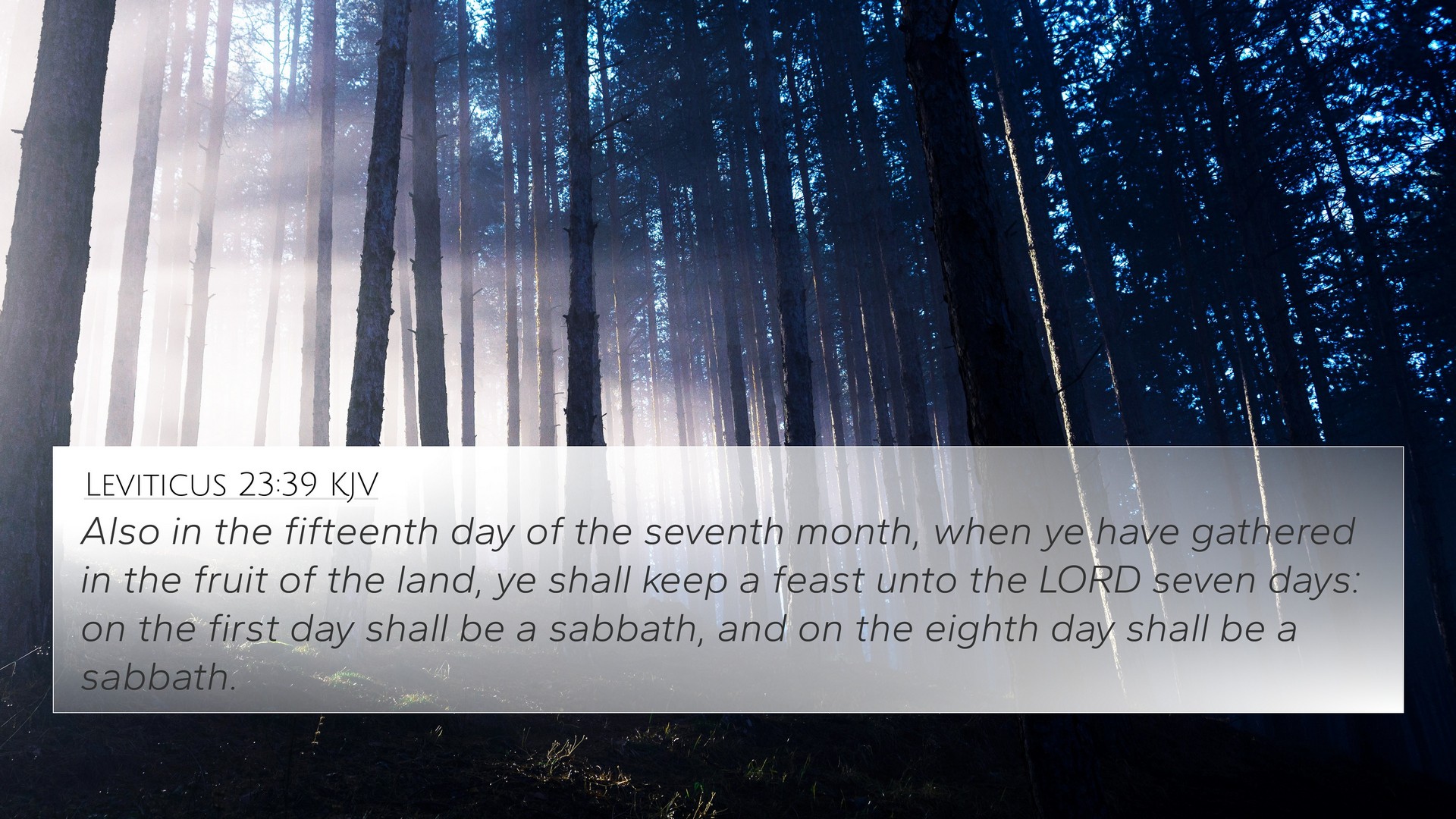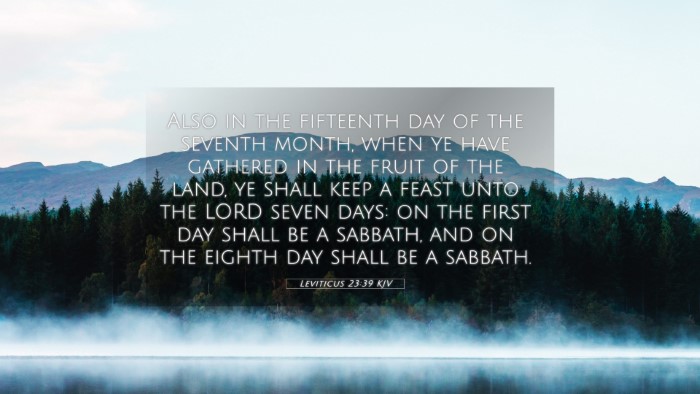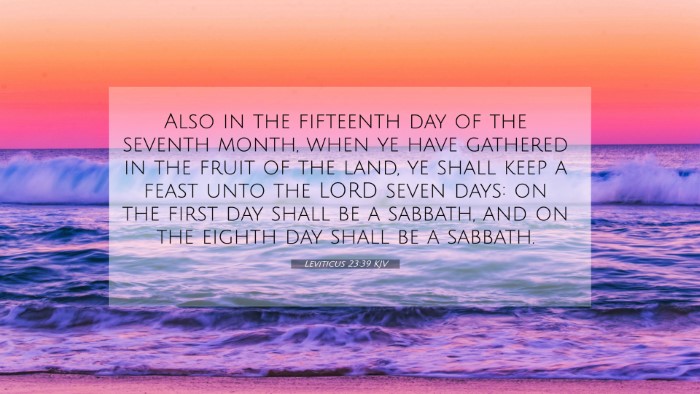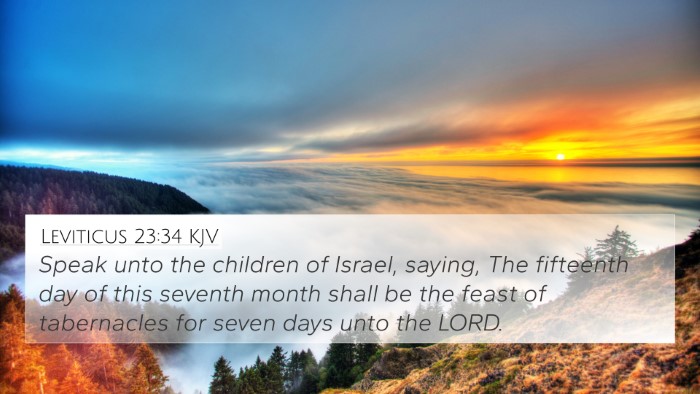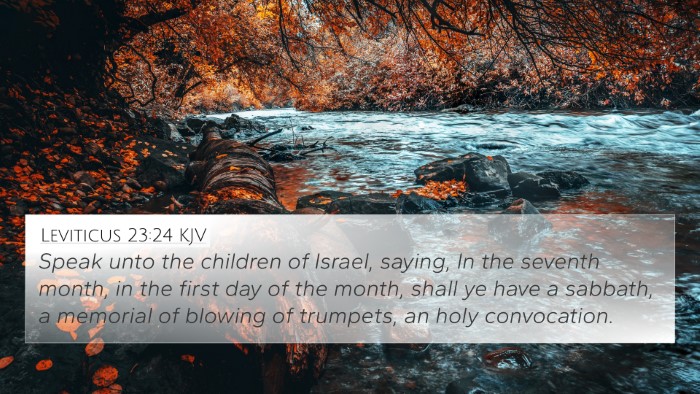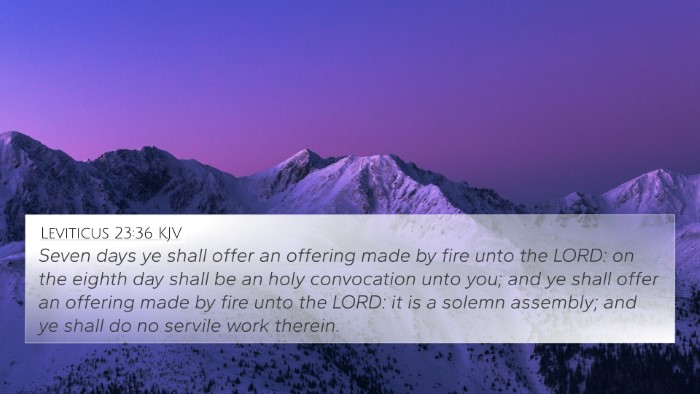Understanding Leviticus 23:39
Leviticus 23:39 serves as a pivotal scripture in the book of Leviticus, highlighting the significance of the Feast of Tabernacles. It falls within the instructions regarding the appointed feasts, which God commands the Israelites to observe. These feasts are crucial for the communal and spiritual life of Israel, reflecting God’s ongoing relationship with His people.
Verse Text
“Also on the fifteenth day of the seventh month, when you have gathered in the fruit of the land, you shall keep the feast of the LORD seven days; on the first day shall be a solemn rest, and on the eighth day shall be a solemn rest.” (Leviticus 23:39, ESV)
Verse Summary
This verse commands the Israelites to celebrate the Feast of Tabernacles (or Sukkot) starting on the fifteenth day of the seventh month. This occasion comes after the harvest, marking it as a time of thanksgiving and remembrance. The emphasis on rest highlights the complete sanctity of this festival.
Commentary Insights
Matthew Henry’s Commentary
Henry emphasizes the importance of this feast as a reminder of God’s providence and the Israelites' time in the wilderness. He notes that the command not only pertains to physical gathering but also invites spiritual reflection whereby worship becomes intertwined with thanksgiving during the harvest season. The observance is described as a time of joy and deep recognition of God’s faithfulness in providing for His people.
Albert Barnes’ Commentary
Barnes points out that the Feast of Tabernacles is significant as it represents the connection between the harvest and divine blessings. He explains that it is a reminder of the transient nature of life, reflected in the temporary shelters (tabernacles) that the Israelites lived in during their wilderness journey. The notion of resting on the first and the eighth days underscores the need for both celebration and reflection on God’s glorious provision.
Adam Clarke’s Commentary
Clarke notes the two main dimensions of the feast: celebration of the harvest and the remembrance of the Israelites' journey. He highlights the requirement for solemn rest, interpreting it as an opportunity for spiritual rejuvenation and gratitude. Surrounding this festivity, he stresses the importance of community, as families gather to participate in the joy and thanksgiving toward God, thereby reinforcing communal bonds.
Bible Cross-References
- Exodus 23:16 - Reference to the Feast of Harvest and gathering.
- Deuteronomy 16:13-15 - Instructions on the Feast of Tabernacles and the joy it should bring.
- Leviticus 23:34 - Establishing the Feast of Tabernacles as a significant celebration.
- Nehemiah 8:14-18 - Observation of the Feast in post-exilic Israel.
- John 7:2, 10 - The connection of Jesus to the Feast of Tabernacles in the New Testament context.
- Zechariah 14:16-19 - Prophecy concerning the celebration of the feast in eschatological terms.
- Hebrews 11:9-10 - Reflection on the sojourn of the faithful, connecting to themes of dwelling during the festival.
Thematic Connections
The themes of harvest, thanksgiving, remembrance, and community are central to Leviticus 23:39 and find parallels in various scriptures throughout the Bible. Here, we witness how Old Testament celebrations and observances foreshadow New Testament truths about God’s provision and community among believers.
Exploring Connections Between Bible Verses
The celebration of the Feast of Tabernacles creates a powerful narrative that spans across both the Old and New Testaments. By linking scriptures such as John 7, where Jesus attends this feast, we uncover profound insights about His role in fulfilling the law and inviting humanity to partake in the joyous relationship with God that the feast represents. Such connections encourage deeper study through tools for Bible cross-referencing and invite believers to see the unfolding continuation of God's story.
Cross-Referencing Biblical Texts
Cross-referencing these texts reveals how the themes of celebration, rest, and gratefulness interact within scriptural narratives. It encourages a broader understanding of how specific events and observances like the Feast of Tabernacles carry theological weight and reveal God’s continuous narrative of redemption.
Conclusion
Leviticus 23:39 not only serves as an instruction for the Israelites to observe a sacred feast but also possesses rich theological implications that resonate through inter-biblical dialogue. By examining cross-references and thematic connections, we gain deeper insights into the nature of God’s faithfulness and the importance of community worship as outlined in both the Old and New Testaments. Such comprehensive Bible cross-reference materials can enhance spiritual growth and understanding of God's enduring promises.
